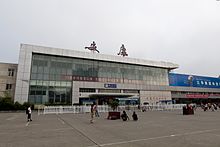Yangpingguan–Ankang railway
 From Wikipedia the free encyclopedia
From Wikipedia the free encyclopedia
| Yangpingguan–Ankang railway (simplified Chinese: 阳安铁路; traditional Chinese: 陽安鐵路; pinyin: Yáng'ān tiělù) | |
|---|---|
 | |
| Overview | |
| Status | Active |
| Termini | |
| Stations | 38 active |
| Service | |
| Type | Heavy rail Regional rail |
| System | China Railway |
| Operator(s) | China Railway Xi'an Group |
| Technical | |
| Line length | 357 km (222 mi) |
| Track gauge | 1,435 mm (4 ft 8+1⁄2 in) standard gauge |
| Operating speed | 150–200 kilometres per hour (93–124 mph) |

The Yangpingguan–Ankang railway or Yang'an railway (simplified Chinese: 阳安铁路; traditional Chinese: 陽安鐵路; pinyin: Yáng'ān tiělù), is a single-track, electrified railroad in China between Yangpingguan and Ankang in southern Shaanxi Province. The line, 356 km (221 mi) in length, follows the upper reaches of the Han River and was built from 1969 to 1972.[1] Major cities and towns along route include Yangpingguan, Mian County, Hanzhong, Chenggu, Yang County, Xixiang, Shiquan, Hanyin and Ankang.
History
[edit]The Yang'an railway was the second electrified railway to be built in China.[2] The railway was built through rugged terrain under dangerous conditions. Some 384 workers died from accidents, an average of more than one fatality per kilometer built.[2]
In 2009, a second track was planned to expand the line's capacity.[3] In 2014, a second line with two-tracks 329 km in length was approved by the National Development and Reform Commission.[4]
Rail connections
[edit]- Yangpingguan: Baoji–Chengdu railway
- Hanzhong: Xi'an–Chengdu high-speed railway
- Ankang: Xiangyang–Chongqing railway, Xi'an–Ankang railway
See also
[edit]References
[edit]- ^ "交通状况". Ankang.gov.cn (in Chinese). 11 November 2011.
- ^ a b "成昆铁路建设:平均建一公里铁路就有一人牺牲(4)". China.com (in Chinese). 12 November 2014.
- ^ "对关于尽快启动阳安复线及兰渝联络线前期工作的建议的复函". Shaanxi Provincial Development and Reform Commission (in Chinese). 5 May 2009. Archived from the original on 25 December 2014.
- ^ "国家发展改革委关于阳平关至安康铁路增建 第二线工程可行性研究报告的批复发改基础[2014]2220号". National Development and Reform Commission (in Chinese). 28 September 2014.
External links
[edit]